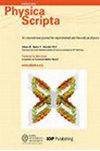在芬斯勒-兰德斯几何中利用巴特尔连接和循环-里曼尼方法开发新的虫洞度量
IF 2.6
3区 物理与天体物理
Q2 PHYSICS, MULTIDISCIPLINARY
引用次数: 0
摘要
在这项研究中,我们的重点是利用芬斯勒-兰德斯几何建立虫洞模型。通过应用芬斯勒连接范围中的巴特尔连接,我们在芬斯勒-兰德斯框架内,用循环黎曼法建立了一种新的虫洞度量,称为循环巴特尔-芬斯勒-兰德斯度量。基本场方程是根据得到的以η(r)为特征的度量张量来表述的,η(r)在表征模型的各向异性方面起着关键作用。为了探索芬斯勒几何在解决虫洞存在问题上的应用,我们采用了指数形状函数。此外,为了简化分析的计算,并讨论芬斯勒-兰德几何的各向异性效应,我们采用了一种特定的各向异性参数函数形式,其中α是一个常数,对各向异性有影响,η(r)是兰德斯公设中矢量场的一个非零分析分量。此外,我们还考虑了指数 n =-1、0 和 1 的三个不同值,随后,我们为这三个 n 值分别建立了恒定和非恒定红移函数的两个不同模型。我们分析了η(r)对能量条件的物理影响。我们的结果证明了各向异性对虫洞稳定性和结构的关键影响,强调了在特定条件下对奇异物质的要求。这项研究加深了对芬斯勒几何中虫洞物理学的理解,揭示了这些宇宙结构的存在和稳定性所必需的理论框架。本文章由计算机程序翻译,如有差异,请以英文原文为准。
Developing novel wormhole metrics in finsler-randers geometry using the barthel connection and osculating-riemannian method
In this research, we focus on modelling a wormhole using Finsler-Randers geometry. By applying the Barthel connection from the range of Finslerian connections, we have developed a new wormhole metric, termed the osculating Barthel-Finsler-Randers metric, through the osculating-Riemannian method within the Finsler-Randers framework. The fundamental field equations are formulated in terms of the obtained metric tensor characterised by η(r), which plays a pivotal role in characterizing the anisotropy of the model. To explore the application of Finsler geometry in addressing the existence of a wormhole, we adopt an exponential shape function. Further, in order to streamline the computational aspects of our analysis, and to discuss the effect of anisotropy effect of Finsler Rander geometry, we adopt a specific functional form for the anisotropic parameter where α is a constant with implications for the anisotropy, among various possibilities for η(r) a non-zero analytical component of vector field in Randers metric. In addition, we consider three distinct values for the exponent n = −1, 0, and 1 and subsequently, we proceed to develop two distinct models for each of these three values of n with constant and non-constant redshift function. We analyse the physical implications of η(r) on the energy conditions. Our results demonstrate the crucial impact of anisotropy on the stability and structure of wormholes, emphasizing the requirement of exotic matter under specific conditions. This research deepens the understanding of wormhole physics within Finsler geometry, shedding light on the theoretical frameworks essential for the existence and stability of these cosmic structures.
求助全文
通过发布文献求助,成功后即可免费获取论文全文。
去求助
来源期刊

Physica Scripta
物理-物理:综合
CiteScore
3.70
自引率
3.40%
发文量
782
审稿时长
4.5 months
期刊介绍:
Physica Scripta is an international journal for original research in any branch of experimental and theoretical physics. Articles will be considered in any of the following topics, and interdisciplinary topics involving physics are also welcomed:
-Atomic, molecular and optical physics-
Plasma physics-
Condensed matter physics-
Mathematical physics-
Astrophysics-
High energy physics-
Nuclear physics-
Nonlinear physics.
The journal aims to increase the visibility and accessibility of research to the wider physical sciences community. Articles on topics of broad interest are encouraged and submissions in more specialist fields should endeavour to include reference to the wider context of their research in the introduction.
 求助内容:
求助内容: 应助结果提醒方式:
应助结果提醒方式:


